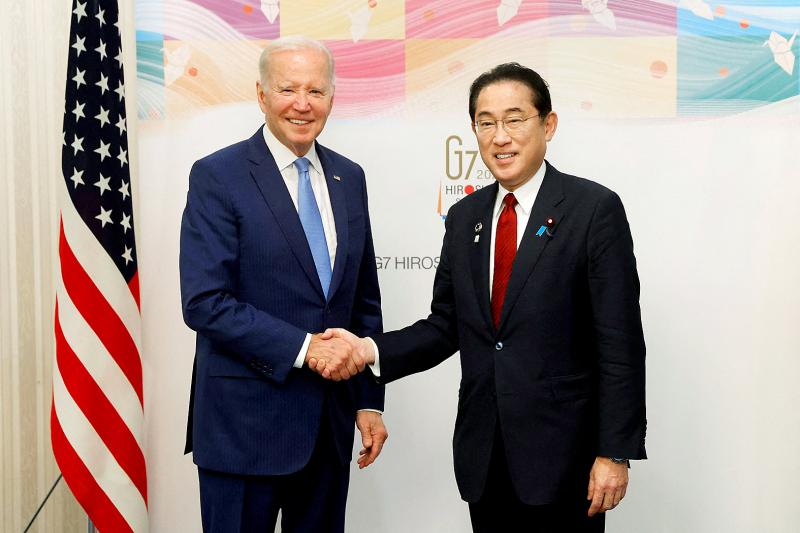US President Joe Biden and Japanese Prime Minister Kishida Fumio reiterated their "resolve to maintain peace and stability across the Taiwan Strait" after the two leaders met in Hiroshima, Japan on Thursday ahead of the openning of the G7 Summit.
The two national leaders "committed to work closely together to address regional security challenges," with Biden calling the US-Japan Alliance "the cornerstone of regional peace and prosperity," according to a readout of the meeting released by the White House.
The regional challenges both leaders seek to address together include "the Democratic People's Republic of Korea's (DPRK) nuclear and ballistic missile programs and coercive behavior by the People's Republic of China that runs counter to international law," according to the readout.

Photo: Reuters
The two leaders also "underscored their opposition to any attempts to change the status quo by force, and reiterated their resolve to maintain peace and stability across the Taiwan Strait," according to the readout of the meeting held ahead of the Group of Seven (G7) nations' three-day gathering on May19 to 21.
In addition, they reaffirmed in the readout their support for "ASEAN centrality," and emphasized the importance of increasing multilateral cooperation in the Indo-Pacific region.
The US and Japan will also continue supporting Ukraine "as it defends itself from Russia's brutal and unlawful invasion," the two leaders were cited as saying in the readout.
Apart from regional security issues, Biden and Kishida also addressed efforts to bolster economic cooperation, including through negotiations on the Indo-Pacific Economic Framework (IPEF), the promotion of clean and secure energy, and the establishment of diverse and resilient critical minerals supply chains, according to the readout.

CHAOS: Iranians took to the streets playing celebratory music after reports of Khamenei’s death on Saturday, while mourners also gathered in Tehran yesterday Iranian Supreme Leader Ayatollah Ali Khamenei was killed in a major attack on Iran launched by Israel and the US, throwing the future of the Islamic republic into doubt and raising the risk of regional instability. Iranian state television and the state-run IRNA news agency announced the 86-year-old’s death early yesterday. US President Donald Trump said it gave Iranians their “greatest chance” to “take back” their country. The announcements came after a joint US and Israeli aerial bombardment that targeted Iranian military and governmental sites. Trump said the “heavy and pinpoint bombing” would continue through the week or as long

TRUST: The KMT said it respected the US’ timing and considerations, and hoped it would continue to honor its commitments to helping Taiwan bolster its defenses and deterrence US President Donald Trump is delaying a multibillion-dollar arms sale to Taiwan to ensure his visit to Beijing is successful, a New York Times report said. The weapons sales package has stalled in the US Department of State, the report said, citing US officials it did not identify. The White House has told agencies not to push forward ahead of Trump’s meeting with Chinese President Xi Jinping (習近平), it said. The two last month held a phone call to discuss trade and geopolitical flashpoints ahead of the summit. Xi raised the Taiwan issue and urged the US to handle arms sales to

BIG SPENDERS: Foreign investors bought the most Taiwan equities since 2005, signaling confidence that an AI boom would continue to benefit chipmakers Taiwan Semiconductor Manufacturing Co’s (TSMC, 台積電) market capitalization swelled to US$2 trillion for the first time following a 4.25 percent rally in its American depositary receipts (ADR) overnight, putting the world’s biggest contract chipmaker sixth on the list of the world’s biggest companies by market capitalization, just behind Amazon.com Inc. The site CompaniesMarketcap.com ranked TSMC ahead of Saudi Aramco and Meta Platforms Inc. The Taiwanese company’s ADRs on Tuesday surged to US$385.75 on the New York Stock Exchange, as strong demand for artificial intelligence (AI) applications led to chip supply constraints and boost revenue growth to record-breaking levels. Each TSMC ADR represents

Pro-democracy media tycoon Jimmy Lai’s (黎智英) fraud conviction and prison sentence were yesterday overturned by a Hong Kong court, in a surprise legal decision that comes soon after Lai was jailed for 20 years on a separate national security charge. Judges Jeremy Poon (潘兆初), Anthea Pang (彭寶琴) and Derek Pang (彭偉昌) said in the judgement that they allowed the appeal from Lai, and another defendant in the case, to proceed, as a lower court judge had “erred.” “The Court of Appeal gave them leave to appeal against their conviction, allowed their appeals, quashed the convictions and set aside the sentences,” the judges